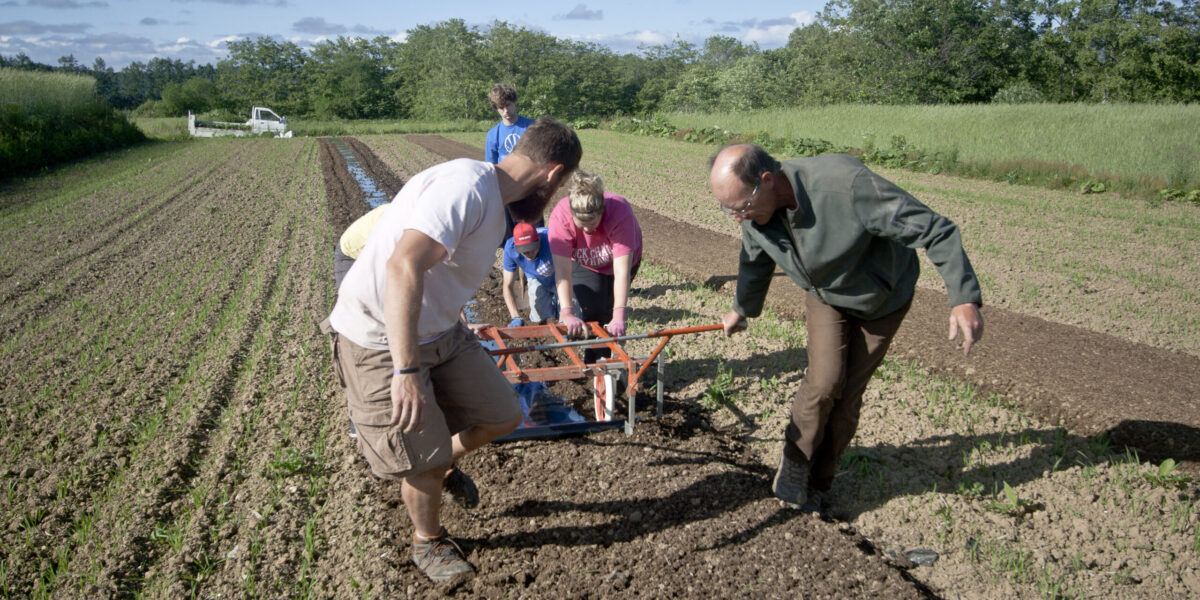Note: This article has been edited for length. The full piece was originally published in Japanese in Aino magazine, and in English in the Asian Rural Institute journal Eudoo.
The word "chain" takes on a very different meaning for slaves than it does for transnational corporations. A slave’s broken chain results in freedom. A transnational corporation’s broken chain results in the loss of profit and control. The COVID-19 pandemic has broken multiple supply chains in the global food system. Major players in the system, and perhaps many consumers in the developed world, want to see these chains fixed so that the world can get back to business as usual. We need reminding that maintaining business as usual props up a system that has historically exploited farmers and impoverished our soils. Such a system, ultimately, cannot endure. But how can we break free?
COME OUT FROM EMPIRE
For me, the topic of the Bible is politics.1
The Bible tells about first century exploitation. In the Book of Revelation, also known as the Apocalypse of John, the author writes to small Christian communities located in Asia Minor. Apocalypse means unveiling, a revealing of the sovereignty of God over all of life. This region was being transformed into large scale Roman latifundia (plantations), growing high-value crops for the city of Rome. Roman tax and land ownership laws favored Roman citizens over the native residents of the conquered territories. The local people became poor, hungry and indebted.
Apocalyptic literature does not foretell the future. It does, however, unveil universal truths for the time it was written, which serve as a source of encouragement and hope to those being exploited by unjust systems.
In the Book of Revelation, Babylon symbolically represents any nation, corporation or system that demeans human life and exploits creation for the sake of gaining power or wealth.2 In chapter 18, Babylon perceives itself as indestructible, without rival, and incapable of failure. "In her heart she boasts, ‘I sit as queen; I am not a widow, and I will never mourn" (v. 7, New International Version). But systems that do not serve life fall under God’s sovereign judgment. Along with Babylon, all the kings and merchants of the earth, who grew rich from her excessive luxuries and who joined in her exploitation, will weep and mourn. "Woe! Woe, o great city, o Babylon, city of power! In one hour, your doom has come!" (v. 10; c.f. 16-17, 19). This literature is not a historic recalling of events nor a prediction of the future. It is a reminder to believing communities that God is sovereign over the nations.
The end of globalization is not the end of the world. It is the end of a system that enslaves people and leads the world to death. Never in our lives has a pandemic so thoroughly shut down the global economy. This signals to me that the systems of the world are coming under judgment for not doing justice.
In the Book of Revelation, an angel calls to the communities on the edge of the empire who are unjustly exploited to, "Come out of her, my people" (18:4). However, we can no more come out of the empire than we can crawl out of our own skin. We remain in the empire, occupying the same territory. Coming out of Babylon was meant in both a physical and ideological sense. Imagination plays an essential role in discerning what it means to come out of the ideals of Babylon. To imagine new ways of living, we need to change our thinking. We need to commit ourselves to live in right relationships with other people and to care for the land that sustains our lives. New ways of living are the ways in which our words become flesh.
Wendell Berry writes that, "We must begin by giving up the belief that we can bring about these healings without fundamental changes in the way we think and live. We face a choice that is starkly simple: we must change or be changed. If we fail to change for the better, then we will be changed for the worse. We cannot blunder our way into health by the same sad and foolish hopes by which we have blundered into disease … The aims of productivity, profitability, efficiency, limitless growth, limitless wealth, limitless power, limitless mechanization and automation can enrich and empower the few (for a while) but they will sooner or later ruin us all.3"
BREAKING THE (FOOD) CHAINS OF BABYLON
Earlier in my life, my wife, Akiko, and I, with our family and others, grew food in a Community-Supported Agriculture (CSA) project called Menno Family Village. At our peak, we grew food for 90 families in Sapporo and some smaller surrounding cities in Hokkaido, Japan. Over the years, many government and university researchers asked us: Why isn’t this idea spreading? I shared many reasons, but in hindsight, perhaps the time was not right.
When I think back to 30 years ago, when I helped to organize a CSA pilot project in Winnipeg, a farm crisis had enveloped the surrounding rural areas. The crisis was sparked by the U.S. government dumping wheat into the global market, driving prices down so low the Canadian farmers could not survive. Bankruptcies and farm suicides saturated the news, and people in the cities felt helpless. Thankfully, however, journalists, rural development experts and university researchers began to brainstorm new ways of creating partnerships between farmers and city people that could liberate farmers from the control of decision-makers in Washington, D.C., and the whims of the market.
Within four months, we organized a 200-member CSA. The project began shifting the consciousness of the city and region towards supporting local farmers growing local and in-season food. Is now the time for creating a more just, caring and resilient local food web in Japan?
CSAs are one option for breaking the global food chain, by going directly from farm to table. We can organize food webs that connect people locally. We can find our identity and hope in God, who empowers us by the Holy Spirit to galvanize people into living in right relationships with our fellow human beings and the earth. I believe now is the time to share the task of caring for the soil, caring for our health, and caring for one another. Now is the time to rethink what we eat and how we grow our food. Lessening the animal products we eat will give us more land to grow grains and vegetables. Regenerative no-till vegetable and grain production can cut back on energy usage and enhance soil health and nutrient density of food. Lowering energy use also serves to sequester atmospheric carbon to mitigate climate change. Exposing the problems of global food chains is also an opportunity to connect food and people in new ways.
Systems can unexpectedly collapse. A little more than 30 years ago, totalitarian governments crumbled; the most symbolic of which was the fall of the Berlin Wall. In 2011, nuclear reactors in Fukushima failed. Now, global food chains are breaking, and it is uncertain what will happen in Japan.
Our hope is in knowing God’s love for us and the whole of creation. It is God who loves us and sustains the world. It is God who stands above the world powers to bring down systems and create new beginnings. To care and to selflessly love is not the exclusive ability of a narrow sect. Whenever or wherever love for others is being expressed, land is lovingly cared for, and justice is embodied, there God is. There, in the struggle, is where we discover our humanity and chains — even those of an oppressive global food system — are broken.
NOTES
1. William Stringfellow, An Ethic for Christians and Other Aliens in a Strange Land (Eugene, Oregon: Wipf & Stock Publishers, 2004), 14.
2. Ibid., 32.
3. Wendell Berry, Sex, Economy, Freedom & Community (New York: Pantheon Books, 1992) 12.








